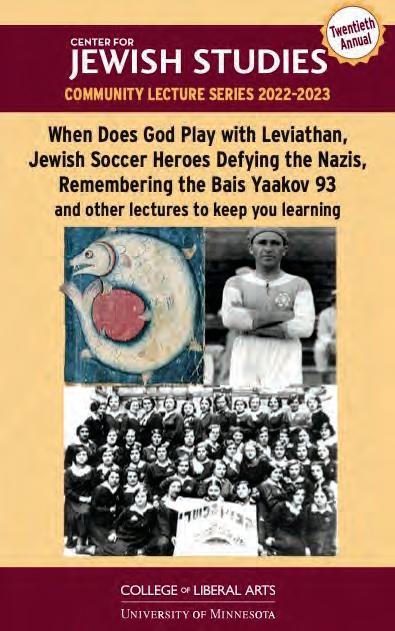
4 minute read
Antisemitism Symposium
CJS HOSTS TWO-DAY SYMPOSIUM: ANTISEMITISM & RACISM IN A MOMENT OF RECKONING
On November 8 and 9, 2022, the Center for Jewish Studies in partnership with the Center for Holocaust and Genocide Studies hosted a two-day virtual symposium, “Antisemitism and Racism in a Moment of Reckoning,” organized by Center faculty Alejandro Baer, Leslie Morris, Natan Paradise, Riv-Ellen Prell (Emerita), and Daniel Schroeter. The conference was convened in response to national and international issues with regard to both antisemitism and racism—and the often insufficiently acknowledged link between the two—as well as in response to specific events on campus in which the complex identity and relation of Jews to White majority society was discounted in the conduct of anti-racism trainings in the College of Liberal Arts.
Advertisement
The symposium featured an international panel of speakers gathering in two roundtable discussions, via Zoom, to address the following:
How do racism and antisemitism overlap and where do they diverge and why? The public debate in the US and Europe alongside the widespread initiatives that underpin the current moment of reckoning with the legacies and ramifications of racism have insufficiently captured the complex relation of Jews to White majority society and the pervasive nature of antisemitism. How have different scholars, activists and educators engaged with this issue? What are constructive ways we can better deal with antisemitism in anti-racist scholarship and practice? How has antisemitism and the Jewish experience been included or excluded in diversity, equity, and inclusion initiatives on US campuses?
The first roundtable, “Historical, Legal, and Theoretical Perspectives,” was moderated by Jonathan Judaken (Spence L. Wilson Chair in Humanities at Rhodes College) and featured Tony Michels (History, UW Madison), Joshua Shanes (Jewish Studies, College of Charleston), Keith Kahn-Harris (Sociology, Leo Baeck College, London), and Claudia Bruns (History and Cultural Studies, Humboldt University, Berlin). The second roundtable, “Diversity, Equity, & Inclusion Work and Antisemitism on US Campuses,” was moderated by Malinda Lindquist (Associate Dean for Diversity, Equity, and Inclusion, College of Liberal Arts, and Dept. of History, University of Minnesota) and featured Amna Khalid (History, Carleton College), Jeffrey Aaron Snyder (Education, Carleton College), Erin Darby (Religious Studies, University of Tennessee), and Natan Paradise (Center for Jewish Studies, University of Minnesota). The first roundtable garnered 145 attendees and the second 122. Jonathan Judaken expertly conducted the first roundtable, framing it in terms of two trials ongoing at the time: the criminal trial of the murderers of Ahmaud Arbery and the civil trial of the organizers of the deadly Unite the Right Rally in Charlottesville. In the first case anti-Black racism was foregrounded, whereas in the Unite the Right Rally racism and antisemitism were prominently intermingled, and Judaken suggested that the two trials were “about the two guises of white supremacy in America.” As Judaken noted, “ Anti-Jewish and anti-Black racism are often split in how we think about them, but our goal here is to frame them together and also think about why and how they become split.” He also observed that the University of Minnesota was the perfect place to host the conversation because “in an odd way it’s the epicenter of this moment of racial reckoning”; George Floyd was murdered in Minneapolis, Representative Ilhan Omar of Minneapolis has become a lightning rod for “claims that the Democratic Party is slipping into certain forms of leftist antisemitism, especially in its attitudes toward Israel,” and Riv-Ellen Prell’s research has drawn attention to the history of anti-Black and anti-Jewish prejudice at the University of Minnesota. But, Judaken insisted, these are not merely local issues; it is a global conversation, and the symposium was organized so as to allow consideration of the issues from both a European and American perspective.
In the second roundtable, CLA Associate Dean Malinda Lindquist productively framed the conversation about diversity, equity, and inclusion work and antisemitism on U.S. campuses as an opportunity “to learn more about how and where colleges and universities are doing this work well, as well as how and where colleges and universities are stumbling in these efforts.” She noted that at the University of Minnesota (and this is true of almost all U.S colleges and universities) the centering in DEI work of “underrepresented populations who face systemic barriers that impact their experiences on campus” does not include specific attention to antisemitism, although an intersectional approach “does address issues of access and climate for individuals who might encounter barriers based on their religious expression, age, national origin, ethnicity, or veteran status.” “What is not accounted for here,” she acknowledged, “is a long history of White Christian supremacy” as “the complicated Jewish identity has been subsumed under a religious designator, and that designator wielded as a racist as well as a racial tool. That is, what is missing are the historical and contemporary contexts, specifically the powerful ways in which racism and antisemitism in this case are deeply interconnected.” The panelists in this second roundtable presented critiques of the assumptions and strategies that characterize much of the DEI and anti-racism trainings that are offered on U.S. campuses, and that consistently neglect antisemitism or misrepresent the experience and identity of Jews. They offered suggestions for engaging with the resistance in DEI efforts to including attention to the Jewish experience, and they provided both historical and conceptual explications that account for what Lindquist termed the “stumbling” in DEI initiatives with regard to Jewish students, faculty, and staff on U.S. campuses.
To listen to recordings of the entire symposium, please visit https://cla.umn.edu/jewish-studies/news-events/antisemitism-and-racism-moment-reckoning-symposiumrecordings-available-now





